- Home
- Patricia MacLachlan
My Father's Words
My Father's Words Read online
Dedication
In memory of Bob,
P. M.
With thanks to Bill.
Contents
Cover
Title Page
Dedication
Chapter 1: The Eternal Fitness of Things
Chapter 2: Hero
Chapter 3: Words
Chapter 4: Emma
Chapter 5: Turnabout
Chapter 6: Always the Sun
Chapter 7: Comfort
Chapter 8: Let It Float Down the River
Chapter 9: Dona Nobis Pacem
Chapter 10: Jenny
Chapter 11: The Celebration of Emma: Music Brought Her Back
Author’s Note
About the Author
Books by Patricia MacLachlan
Back Ads
Copyright
About the Publisher
Chapter 1
The Eternal Fitness of Things
My father, Declan O’Brien, beloved shrink to many people, sings as he makes omelets for our breakfast.
My father is not fond of my word “shrink.” He prefers “psychologist.” But he is patient with me.
“Do you talk in your sessions?” I once asked him.
He smiled.
“We talk, or not,” he said.
I’m not sure what that means, but one day I may know the meaning of his words.
He sings his favorite egg-making song, his favorite hiking song, his favorite basketball-playing song—called “Dona Nobis Pacem.”
“Dona nobis pacem, pacem.
Dona nobis pacem.”
My father’s voice is sweet and he sings in tune.
The eggs will be too runny. He always makes them too runny, and he knows my younger brother, Finn, and I will slip them back into the frying pan until the eggs are hard. Finn once skimmed a stack of hard omelets across the backyard like Frisbees, evidence of his second-grade sense of humor.
“Passive aggressive?” I suggest to my father, who has taught me something about psychology.
I know passive aggressive means he might be doing the nice thing of cooking us eggs, while not making them the way we like.
My father is impressed. He smiles at me and shakes his head.
“It’s the eternal fitness of things, Fiona,” my father says, peering at me.
“He grew up with runny eggs,” says Finn.
“How do you know that?” I ask.
“He tells me things,” says Finn. “Because I ask him.”
“What’s that? The eternal fitness of things?” I ask my father.
His cell phone rings. Trouble calling.
I don’t hear the answer to “the eternal fitness of things.” Not then. Not ever from my father.
My father sets down the phone and puts on his jacket.
“Emergency,” he says quickly. “Tell your mom when she gets home, Fiona. She’s in class.”
My mother is getting a degree in something undefined. Somewhere between philosophy, dance, and making brushed-wool dolls for preschoolers. She has been at it for two years, and my father has made his appointments around her schedule.
Once when Finn, my father, and I were playing basketball in the driveway, I made a joke of my mother studying early childhood.
“Kids are kids,” I said.
My father did not smile. He was serious, and I knew it.
He grabbed the basketball from me.
“We can learn more from children than we sometimes learn from adults. They are open. No prejudgments. Your mother knows that.”
He made a perfect jump shot into the basket.
“Swish,” he said happily. “Soon my jump shot will be as fine as your mother’s.”
I listened. And now when I look at little children, I think of my father’s words. Children are wise, but they don’t know how wise. And sometimes they don’t have words for what they know.
My father hurries to the car and backs out of the driveway.
On the way to his clinic a truck driver hits him as my father swerves to avoid a child chasing a ball into the street.
By the time the phone call came, my father was dead.
“Dr. O’Brien died on impact, Mrs. O’Brien,” said the doctor to me, thinking I was my mother. For some reason the phone was on speakerphone, so Finn heard what I heard.
I couldn’t protect him.
“Mrs. O’Brien?” the doctor asked softly. He told me more details, but I stopped hearing.
I slowly hung up the phone.
Finn’s face was very pale. Tears began to slip down his cheeks.
Without knowing what I was doing or why I was doing it, I took down two white plates.
I slipped the cold omelets onto the plates and put them on the table.
We began eating the runny omelets my father made for us. Neither Finn nor I talked. We just ate.
It seemed like the only thing to do.
Maybe it was the eternal fitness of things, whatever that is.
Our mother came in the door, so quietly that we didn’t hear until she sat next to us at the table. Her jacket made a swishing sound against the chair. I thought of my father’s words after his perfect jump shot into the basket.
“Swish.”
“The hospital called my cell phone,” she said softly. “After they talked to you.”
She looked thin and pale, like Finn, and deflated, as if the air had been swept out of her. It was quiet, strange with my mother in the room since she always laughed. My father smiled, but my mother laughed.
Across the table Finn straightened.
“It happened because he swerved the car so he wouldn’t hit a child chasing a ball into the street,” said Finn, startling us. It was the first time he’d spoken since the phone call.
“No one told me that,” said my mother, her voice a whisper. “Of course he would do that.”
“How could a mother allow her child to chase a ball into the street?” asked Finn loudly.
“How could a mother let this happen to you?” said my mother, echoing Finn’s words.
She looked at our plates.
“You’re eating your father’s runny eggs,” she said.
And that was when she began to cry.
Finn and I put our arms around her then, and she seemed to grow into our mother, taking us both into her arms, growing larger and stronger again.
Chapter 2
Hero
My father’s will said “no funeral.” Included with the will was a note from him.
“Have a party!” it said in his handwriting. “Eat cake, drink champagne, and play basketball!”
“May I drink champagne?” asked Finn.
“No,” said my mother.
She smiled. Maybe one day soon she’d laugh.
“At least I can eat and play basketball,” said Finn.
“Yes. Basketball is good,” said my mother.
She had a faraway look, and I knew she was thinking about the times she and my father played loud and competitive basketball games. It was embarrassing. Sometimes our neighbors Duke, Daisy, and their son, Luke, who was in my fifth-grade class, came out to watch as my parents called, “Out of my way, Claire!” and “Watch this, Dec!” loudly. My mother always made her three-pointers. Duke was amused. He wasn’t competitive. But Daisy was a scrapper, taught by my mother. She once sank a wild midcourt basket while facing away from the hoop. Duke just shook his head.
The party for my father was somehow both joyful and sad, with laughter and tears all mixed up. Finn and I were confused at that. My grandparents were ill and far away and couldn’t come. My mother spoke to them every day on the phone. But cousins and aunts and uncles came. And friends.
My father’s brother, Uncle Connor, came, l
ooking so much like my father, it made my throat hurt. He put his arms around us, trying to be our father.
But he wasn’t.
Luke came with Daisy and Duke. Luke sat between Finn and me, saying nothing. Luke didn’t talk much ever, and that was one of the things I liked about him.
“I’m here,” he said finally.
“I see that. Thanks.”
Finn moved closer to Luke.
And we just sat.
People came and went. And at the very end of the day the doorbell rang.
“Would you get that?” my mother called to me.
I went to the door and saw a young man standing on the steps.
He looked familiar.
“Hello, Fiona,” he said calmly. “I won’t come in, but I have a card for your family.”
When I heard his voice, I remembered when I was very young and he had come to the house.
I’m four, and Thomas says hello to my mother and comes in the house. He carries a rug and a wastebasket and a guitar.
“I’ve come to move in for a while,” he says.
My mother smiles.
“I’ll call my husband,” she says.
Thomas plays the guitar for me until my father comes and kindly helps Thomas carry his things back out to his car so he can live at his own house.
“No more guitar?” I ask my father sadly, beginning to cry.
My father hugs me.
“I’m sure he’ll come again with his guitar,” he says.
He was one of my father’s favorite patients.
“Thomas?” I said.
“You remember.”
He smiled and handed me the card. “Your father was my hero,” he said. “I wrote that in the card.”
He turned and walked back down the steps. My heart beat faster.
“He was my hero, too,” I said.
Thomas looked at me for a moment.
“I have many wonderful things to tell you about your father. Would you want to hear them sometime?”
I already knew wonderful things about my father. What would I learn from one of my father’s favorite patients, even if he was a nut case?
A cold feeling comes over me as I think that.
I had said “nut case” to my father once, and never ever again. He had made me sit down, and he talked to me about the dignity of people.
“Be thoughtful. Be smart.”
He had taken my hand so I wouldn’t think he was angry with me.
“Be kind.”
It was almost as if my father was there, looking at me with his serious look.
I remembered my father’s kindness to Thomas.
“Yes,” I said at last. “I’ll talk to you, Thomas.”
“I’ll call you once a week for two minutes,” Thomas said. “I don’t want to impose. Two minutes only.”
He held up two fingers.
I nodded.
“Day and time?”
“Six fifty Monday evenings,” I said. “My night to fix dinner.”
Thomas nodded.
“Do you think my father would mind?” I asked.
“No. He wouldn’t mind,” said Thomas.
And then he walked away.
And every Monday at 6:50 I would talk to Thomas.
I watched him walk down the street.
I opened the envelope.
Inside was a folded piece of paper.
Thomas had written two sentences.
DR. O’BRIEN WAS MY HERO.
HE TAUGHT ME OFTEN THE TRUTH IS JUST BEHIND A DOOR.
THOMAS
My mind flashes back to something I haven’t thought of for a long time. It was when I was five.
“What’s real and what isn’t real?” I ask my father.
My father peers at me.
“Open the window and maybe you’ll know,” he says.
“Which window?”
My father taps me on my head.
“That window,” he says.
When I looked down the street, Thomas was gone. I read the note again.
Thomas didn’t sound much like a nut case.
Maybe just a bit of a nut case.
I sighed.
Like the rest of us.
“Play basketball!” my father’s handwritten note had said to us.
In the late darkness, with only moonlight, we played basketball in the driveway. No one talked. My mother took off her good shoes and played barefoot.
I passed the basketball to Finn, who tried a jump shot but missed. It hit the rim, and my mother took it and made one of her perfect jump shots.
Duke came out to stand on his lawn, watching us.
Without thinking about what I was doing, I passed the basketball to Duke. He was not a player.
But Duke, from his grassy side yard, did something that surprised us all. He took a breath and, in perfect form, made a long, arching shot that whispered into the basket. Swish.
We all turned to stare at Duke.
“Declan taught me that at night,” he said simply. “Many nights.”
In the moonlight there were tears on his cheeks.
Chapter 3
Words
Days moved slowly. Nights, too.
Every night my mother put Finn to bed before she went to her room to study.
Every night Finn came into my room, dragging his quilt, to curl up next to me.
Sometimes he cried in his sleep.
Trying to make things better for him was like trying to wind a tangled ball of yarn.
My father could fix this. But my father was the problem.
My mother was here, but not yet here in the old way. But she was trying. She sat us down at the table.
“I am thinking of putting my work off until next summer—my writing and classes. Then I can be here with you. We will spend this summer together.”
Finn didn’t say anything. He looked over at me.
“I’ll be here all summer,” I said.
My voice sounded far away, as if it wasn’t me talking.
“Fiona will take care of me,” Finn said quickly.
Mother kissed us both on the forehead.
“We’ll give it a try,” she said.
And that was how Finn made me his summer mother.
It was my night to cook. Luke opened the screen door and sat at the table.
“Nice meatballs,” he said admiringly.
“Yep. I am the meatball queen. I have to find something else to cook.”
I put the rolled-up meatballs in a pan of oil.
“Is that all you have to say?” I asked Luke.
“Yes,” said Luke. “Where’s Finn?”
I shook my head.
“Upstairs being sad,” I said, and suddenly my eyes filled with tears.
That happened those days when I didn’t expect it.
Luke nodded. He turned and ran up the stairs and knocked at Finn’s bedroom door.
In a while he was back.
He didn’t say anything. He tapped my head the way my father had. When I looked up from stirring meatballs in the pan, Luke was gone.
The phone rang. I looked up at the clock. It was 6:50. I’d forgotten.
The phone rang again.
“Hello.”
“Hello, Fiona. Is this a good time?”
“Yes.”
“How are you?”
“I’m fine, but feeling kind of alone.”
“I once said that to your father. ‘I don’t want to be alone!’
“‘But Thomas,’ he said. ‘You’re always alone.’”
I thought for a moment.
“It’s Finn who is the most sad and alone. He’s not talking.”
“I remembered saying to your father, ‘You’re not talking very much.’ And your father said, ‘I don’t talk unless I have something to say.’”
I thought of Luke, a little like my father. Not many words, but words that meant something.
And now Finn was not talking.
“Maybe Finn
doesn’t know what he wants to say yet. Maybe you need to find something or someone who has been left alone for Finn to help,” said Thomas.
“Like what?”
“You’ll know,” said Thomas. “Maybe whatever it is will make you feel better as well.”
I was quiet.
“Fiona?”
“Yes?”
“I’ll call you next week.”
“Good-bye, Thomas.”
“Good-bye, Fiona.”
I hung up.
I wrote a note on a slip of paper:
Find something to help Finn.
When I turned around, Finn was sitting at the table.
“I can’t stop hating the woman who let her child run out in front of Dad’s car,” said Finn bluntly. “I can’t!”
I sat down next to Finn and put my arm around him.
“We’re going to find something to help you. And help me,” I said.
“What is it?”
“I don’t know. But we’ll find it. Say you believe me. Finn?”
Finn, his face pale, leaned his head on my shoulder.
“I believe you, Fiona,” he said very softly.
It was after dinner, Finn gone to bed, my mother studying in her room. I wiped the counters clean with a cloth. I put the dishes away.
The screen door opened and slapped shut. I jumped.
“Fiona! I have found something to help Finn!”
“Luke? It’s dark outside.”
“I know that,” said Luke.
“I found this note of yours on the counter,” said Luke. “I was here, and no one was in the kitchen.”
Luke held up a printed paper.
“I found this at the post office!”
He read it to me.
“‘Volunteers wanted to spend time with abandoned dogs. They need company. They love children. They will love you. You can read or talk to them. Spend as much time as you can.’”
So many words from Luke for a change.
“It’s at the shelter three blocks away! We can walk there!”
“We?”
Luke shrugged.
“I read the note. And read between the lines,” he said. “Your father told me there was often something left unsaid, but it was there. Between the lines.”
I stared at Luke.
Those were the most words I’d ever heard Luke say.
When he went out through the screen door, I knew he had found something for Finn.

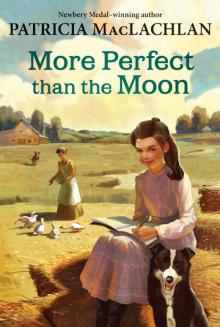 More Perfect Than the Moon
More Perfect Than the Moon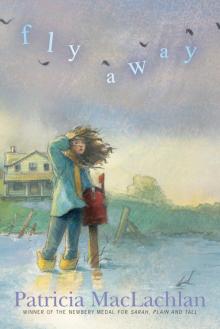 Fly Away
Fly Away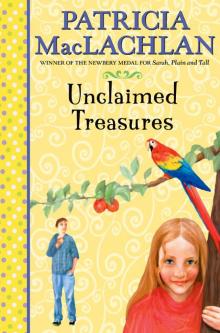 Unclaimed Treasures
Unclaimed Treasures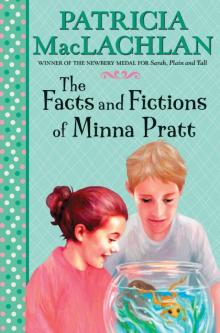 The Facts and Fictions of Minna Pratt
The Facts and Fictions of Minna Pratt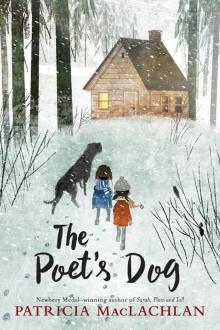 The Poet's Dog
The Poet's Dog Journey
Journey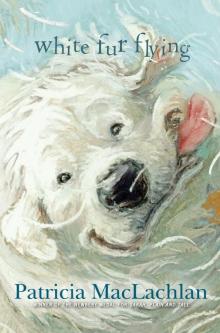 White Fur Flying
White Fur Flying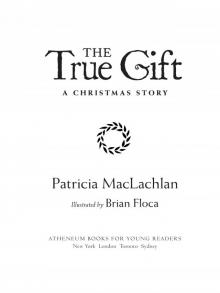 The True Gift: A Christmas Story
The True Gift: A Christmas Story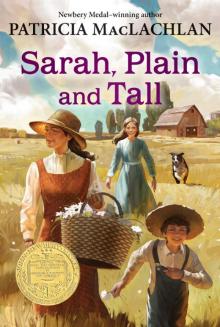 Sarah, Plain and Tall
Sarah, Plain and Tall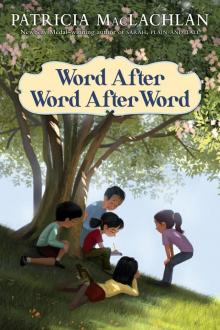 Word After Word After Word
Word After Word After Word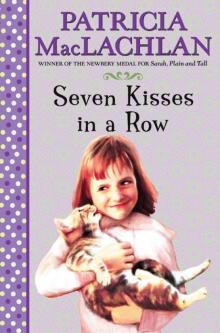 Seven Kisses in a Row
Seven Kisses in a Row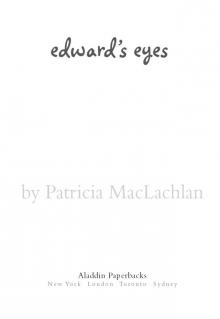 Edward's Eyes
Edward's Eyes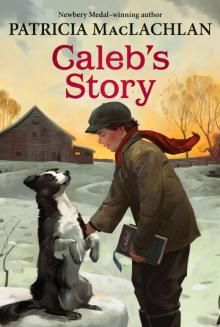 Caleb's Story
Caleb's Story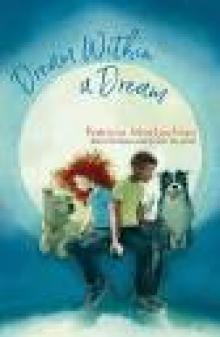 Dream Within a Dream
Dream Within a Dream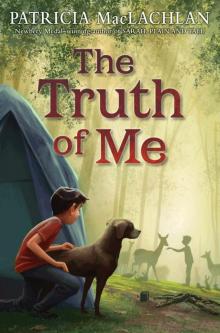 The Truth of Me
The Truth of Me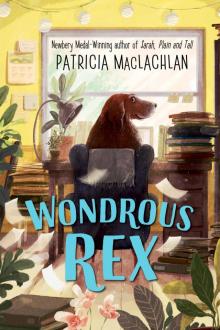 Wondrous Rex
Wondrous Rex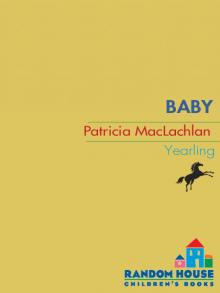 Baby
Baby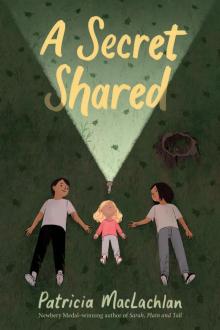 A Secret Shared
A Secret Shared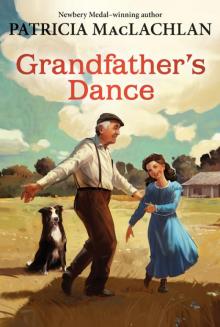 Grandfather's Dance
Grandfather's Dance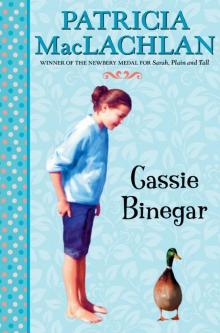 Cassie Binegar
Cassie Binegar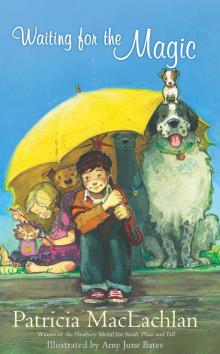 Waiting for the Magic
Waiting for the Magic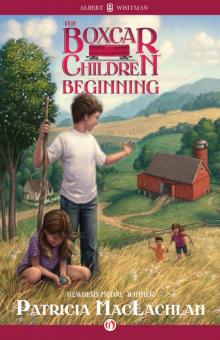 The Boxcar Children Beginning
The Boxcar Children Beginning My Father's Words
My Father's Words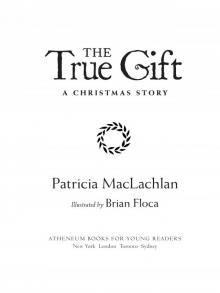 The True Gift
The True Gift